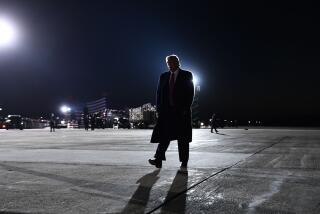We Can Learn a Lot From Truman the Bigot
- Share via
Many who are aware of Harry Truman’s support for Israel and his desegregation of the armed forces are shocked by the anti-Semitic statements contained in his recently discovered 1947 diary. But Truman’s bigotry comes as little surprise to historians who have studied the man and his career.
Truman’s ugly comments about Jews being “very, very selfish” and, as such, not caring “how many Estonians, Latvians, Finns, Poles, Yugoslavs or Greeks get murdered,” or his charge that “neither Hitler nor Stalin has anything on them for cruelty or mistreatment to the underdog,” are distressingly consistent with his disparaging views about other racial and ethnic minorities. As a younger man, he wrote in a 1911 letter to his wife, Bess: “I think one man is as good as another so long as he’s honest and decent and not a nigger or a Chinaman.”
Even his reverential biographer, Merle Miller, admitted in the Truman biography “Plain Speaking” that later in life “privately Mr. Truman always said ‘nigger’; at least he always did when I talked to him.” He also often privately referred to Jews as “kikes.”
Truman’s racism and anti-Semitism may surprise many Americans because he has been sanctified in recent years by hagiographic biographers such as David McCullough and by Democrats and Republicans who admire his leadership during the Cold War. As the country has moved to the right politically, Truman, who toward the end of his presidency had the lowest approval ratings of any modern president, has risen to “near great” status.
Perhaps the latest revelations will inspire a more critical appraisal of Truman and a more insightful understanding of how his personal limitations made him incapable of seizing key historical opportunities.
As a product of the corrupt Tom Pendergast machine that ran Kansas City, Truman was largely shunned during his first term in the Senate by his colleagues. After barely winning reelection without Franklin D. Roosevelt’s support, he was put on the ticket in 1944 by conservative party bosses intent on ousting the crusading liberal Henry Wallace from the vice presidency. They chose Truman not for his convictions or qualifications but because he was pliable, with few enemies.
A Gallup poll released the week of the 1944 Democratic Convention asked Democratic voters whom they wanted as vice president. Sixty-five percent chose Wallace; 2% favored Truman. Roosevelt thought so little of his new vice president that during the 82 days before Roosevelt died the two met just twice. Roosevelt did not even inform Truman that the U.S. was building an atomic bomb.
Limited in vision, ill prepared and plagued by self-doubt, Truman stumbled through his early presidency, and his missteps would chart the course of future history. He quickly replaced the New Dealers and progressives with conservatives like Jimmy Byrnes, who encouraged Truman’s confrontational stance toward Washington’s wartime ally -- the Soviet Union -- at a time when the Cold War might have been averted.
We’ll never know if Truman’s attitudes toward minorities -- including his comment in 1911 to Bess that he hated “Japs” -- influenced his decision to drop two atomic bombs at a point when the Japanese were already militarily devastated and seeking acceptable surrender terms. Truman understood that he was embarking on a course that could ultimately bring the extinction of mankind.
Truman always insisted that he felt “no remorse” over that decision, about which, he commented, he “never lost a minute’s sleep.” Condoleezza Rice picked Truman as man of the last century in an interview with Time magazine, but he was no hero to most of his contemporaries. Those who subsequently orchestrated his historical revitalization have often used his refurbished image to justify a conservative political agenda.
But as the United States rushes into a new era of global domination, military confrontation, international polarization, questionable alliances, spiraling defense budgets and increased reliance on nuclear weaponry, it behooves us to think anew about the wisdom of Truman’s judgments and decisions.
We should question whether his was the kind of presidential vision our own troubled times demand. And we should consider the dangers of placing unlimited power in the hands of extremely limited political leaders.
More to Read
Sign up for our Book Club newsletter
Get the latest news, events and more from the Los Angeles Times Book Club, and help us get L.A. reading and talking.
You may occasionally receive promotional content from the Los Angeles Times.










